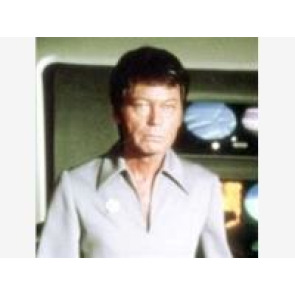DEFOREST KELLEYwas an American actor best known as Dr McCoy in the original Star Trek series and films.He was an experienced actor with more than 150 television and film roles to his name before Star Trek, but it was as the resilient and opinionated Leonard 'Bones' McCoy that he would be remembered after he died on 11 June, 1999, aged 79.Jackson DeForest Kelley was born on 20 January, 1920, in Atlanta, Georgia. His uncle was a doctor and delivered him at the family home. As a child he was a talented choir singer and looked set for a career in music before enlisting in the Army Air Forces in 1943.After the war he decided to become an actor and was spotted by Paramount in a Navy training film, resulting in a leading role in Fear in the Night (1947), a surprise hit. He moved to New York in the 1950s to pursue work in the burgeoning genre of television, acting prolifically in series like Gunsmoke and television dramas, in particular Walter Cronkite's You Are There show where he acted in nine episodes.In 1957 he played Burt Lancaster's brother Morgan Earp in Gunfight at the O.K. Corral, his biggest role to date. This led to many more parts in TV and movie westerns, playing an almost unbroken stream of lawmen, ranchers, villains and officers for the next decade.This only ended in 1966 when he landed his role in Star Trek, a series that Gene Roddenberry had considered calling 'Wagon Train to the Stars' and was arguably a western in space.Dr. McCoy does not appear in the two pilots Roddenberry made to get the show commissioned, but when the series proper began in 1966 he became one of the Enterprise's most important crew members. Resistant to new technology, headstrong and cynical about alien races, he was often in conflict with the likes of Scotty, Spock and Kirk, though he was a loyal friend to the latter whom he informally called Jim.Mr Kelley played chief medical officer McCoy until the original series was cancelled in 1969, then resumed the role in the animated remake (1973), the first six Star Trek films and a 1987 episode of The Next Generation by which time his character had been promoted to admiral.In the early 1970s he had resumed his work in westerns, but as Star Trek became a cult hit he began to feel typecast into sci-fi and went into semi-retirement. He was proud of his role in the seminal series (particular when fans told him 'Bones' McCoy had inspired them to become doctors) but joked that he lived in fear of his catchphrase "He's dead, Jim" being etched on his gravestone. During his later years he wrote two books of poetry, but was the only Star Trek star not to write an autobiography.
Keep me informed of updates

